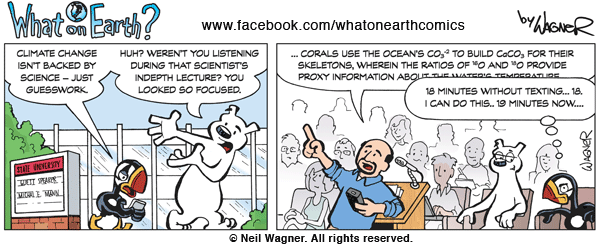

"...climate "science" is a joke, not a scientific field." -- Tom Blumer, NewsBusters
Says you, Tom!... and the U.S. Chamber of Commerce... and the American Reform Party...
But just how legit are the scientific assessments of these unscientific bodies? Let's apply a simple layman's litmus test and see if their claims merit deeper analysis.
Is the basic premise of global warming even logical?
What on Earth has previously addressed the soundness of global warming's underlying formula.
Greenhouse gases and the greenhouse effect occur naturally in our environment. Earth would be too cold for our survival without them, and their existence has been proven by "centuries of science, laws of physics and direct observation." A simple experiment can demonstrate CO2's heat-trapping properties, as you'll see at the 48-second mark of this Bill Nye video. Or you can see the principle proven in Mythbusters' "Young Scientists Special."
So greenhouse gases are real, they keep our atmosphere warm, and human activities are putting additional amounts of greenhouse gases into the atmosphere. As a lawyer might say, "these are the facts of the case and they are undisputed." Given that scenario, isn't man-made global warming -- like it or not -- a logical concept?
Do climate scientists let others see their work -- especially credible scientists who can scrutinize it?
Yes. Climate scientists subject their papers to peer-review. Dr. Wolfgang Wagner, former editor of the journal Remote Sensing, said "Peer-reviewed journals are a pillar of modern science. Their aim is to achieve highest scientific standards by carrying out a rigorous peer review that is, as a minimum requirement, supposed to be able to identify fundamental methodological errors or false claims."
This quote is particularly significant, because Dr. Wagner resigned from his post after issuing an apology for publishing a paper that was "problematic" by those standards and "should therefore not have been published." Scientists take peer review seriously and welcome serious skepticism and scrutiny.
Climate scientists also write books for general consumption. Enter acclaimed climate scientist Michael E. Mann, the guest star of today's What on Earth comic strip. Mann's book, The Hockey Stick and the Climate Wars, lays out the science, the certainties and the uncertainties in climate science today.
Searchable databases of peer-reviewed papers are also available.
Is climate science actually based on recognized scientific principals?
Ever wonder how scientists can estimate temperatures from a time in history when no measurements had been taken? The following passage from Mann's book describes the principle behind using coral for just that purpose -- it was the source for Mann's dialogue in today's cartoon and, dare I say, very very super-sciencey.
Corals, for example, are found in oceanic environments, generally in tropical regions, making them complementary to tree rings in the regions of the globe they sample. Corals assimilate oxygen atoms from the ocean in the form of the carbonate ion, CO3 -2, as their layers of calcium carbonate (CaCO3), skeletons are formed. The ratios of the two main stable isotopes of oxygen (the common, lighter 16O versus the less common, heavier 18O) in the corals' annual growth bands, as it turns out, depend on the temperature and salinity (in turn influenced primarily by rainfall) of the near surface ocean waters they grow in.
Climate science sounds to me like provable scientific principles that are stringently reviewed by panels of experts. With all due respect to the Chamber of Commerce, I'll look to climate scientists for global warming updates. In fairness, though, if I was seeking advice for my multinational corporation, I'd probably give the Chamber the nod.
Like "What on Earth?" on Facebook.
Become a Fan here at The Huffington Post.